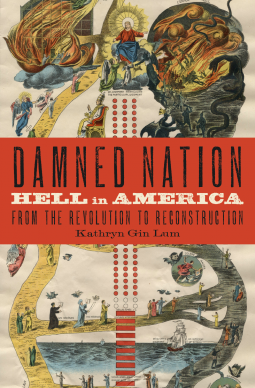
Damned Nation
Hell in America from the Revolution to Reconstruction
by Kathryn Gin Lum
This title was previously available on NetGalley and is now archived.
Buy on Amazon
Buy on BN.com
Buy on Bookshop.org
*This page contains affiliate links, so we may earn a small commission when you make a purchase through links on our site at no additional cost to you.
Send NetGalley books directly to your Kindle or Kindle app
1
To read on a Kindle or Kindle app, please add kindle@netgalley.com as an approved email address to receive files in your Amazon account. Click here for step-by-step instructions.
2
Also find your Kindle email address within your Amazon account, and enter it here.
Pub Date Sep 01 2014 | Archive Date Aug 25 2014
Description
Among the pressing concerns of Americans in the first century of nationhood were day-to-day survival, political harmony, exploration of the continent, foreign policy, and--fixed deeply in the collective consciousness--hell and eternal damnation. The fear of fire and brimstone and the worm that never dies exerted a profound and lasting influence on Americans' ideas about themselves, their neighbors, and the rest of the world.
Kathryn Gin Lum poses a number of vital questions: Why did the fear of hell survive Enlightenment critiques in America, after largely subsiding in Europe and elsewhere? What were the consequences for early and antebellum Americans of living with the fear of seeing themselves and many people they knew eternally damned? How did they live under the weighty obligation to save as many souls as possible? What about those who rejected this sense of obligation and fear? Gin Lum shows that beneath early Americans' vaunted millennial optimism lurked a pervasive anxiety: that rather than being favored by God, they and their nation might be the object of divine wrath. As time-honored social hierarchies crumbled before revival fire, economic unease, and political chaos, "saved" and "damned" became as crucial distinctions as race, class, and gender. The threat of damnation became an impetus for or deterrent from all kinds of behaviors, from reading novels to owning slaves.
Gin Lum tracks the idea of hell from the Revolution to Reconstruction. She considers the ideas of theological leaders like Jonathan Edwards and Charles Finney, as well as those of ordinary women and men. She discusses the views of Native Americans, Americans of European and African descent, residents of Northern insane asylums and Southern plantations, New England's clergy and missionaries overseas, and even proponents of Swedenborgianism and annihilationism. Damned Nation offers a captivating account of an idea that played a transformative role in America's intellectual and cultural history.
Kathryn Gin Lum poses a number of vital questions: Why did the fear of hell survive Enlightenment critiques in America, after largely subsiding in Europe and elsewhere? What were the consequences for early and antebellum Americans of living with the fear of seeing themselves and many people they knew eternally damned? How did they live under the weighty obligation to save as many souls as possible? What about those who rejected this sense of obligation and fear? Gin Lum shows that beneath early Americans' vaunted millennial optimism lurked a pervasive anxiety: that rather than being favored by God, they and their nation might be the object of divine wrath. As time-honored social hierarchies crumbled before revival fire, economic unease, and political chaos, "saved" and "damned" became as crucial distinctions as race, class, and gender. The threat of damnation became an impetus for or deterrent from all kinds of behaviors, from reading novels to owning slaves.
Gin Lum tracks the idea of hell from the Revolution to Reconstruction. She considers the ideas of theological leaders like Jonathan Edwards and Charles Finney, as well as those of ordinary women and men. She discusses the views of Native Americans, Americans of European and African descent, residents of Northern insane asylums and Southern plantations, New England's clergy and missionaries overseas, and even proponents of Swedenborgianism and annihilationism. Damned Nation offers a captivating account of an idea that played a transformative role in America's intellectual and cultural history.
Available Editions
| EDITION | Other Format |
| ISBN | 9780199843114 |
| PRICE | $33.95 (USD) |







